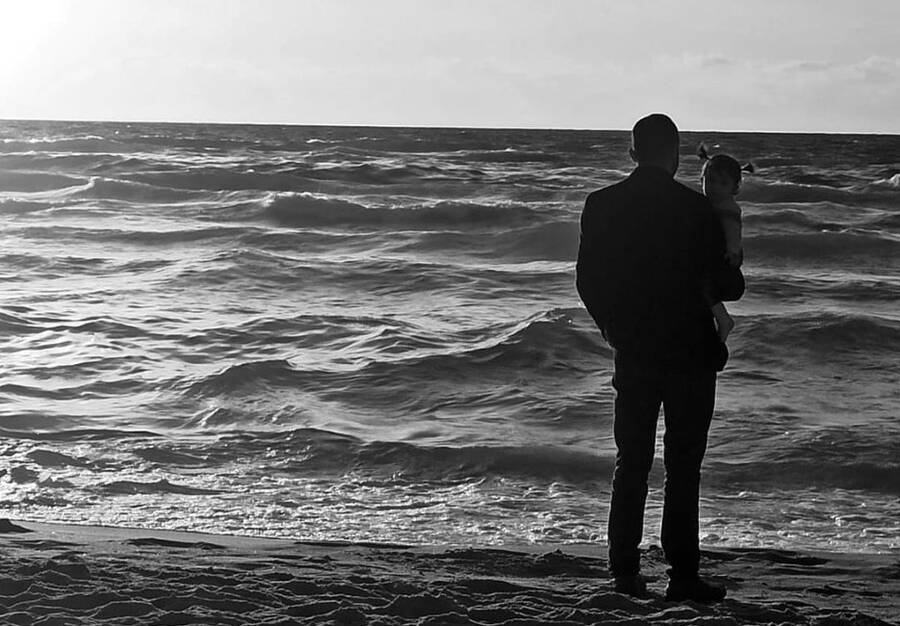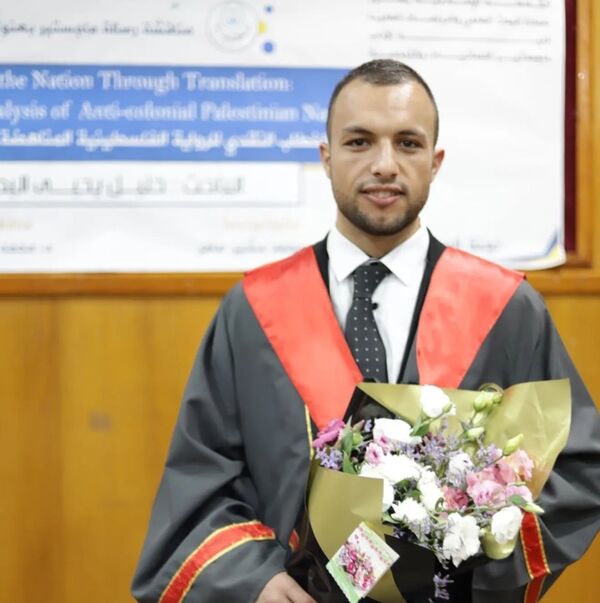Remembering Khalil Abu Yahia
The Gazan scholar and activist, who was killed in an Israeli airstrike last month, believed in the radical potential of solidarity.

Khalil at the sea with his daughter.
“כי הוו מיפטרי מהדדי, אמר ליה: ליברכן מר. אמר ליה: אמשול לך משל, למה הדבר דומה? לאדם שהיה הולך במדבר והיה רעב ועיף וצמא, ומצא אילן שפירותיו מתוקין וצילו נאה ואמת המים עוברת תחתיו. אכל מפירותיו ושתה ממימיו וישב בצילו. וכשביקש לילך, אמר: אילן, אילן, במה אברכך? אם אומר לך שיהו פירותיך מתוקין, הרי פירותיך מתוקין! - שיהא צילך נאה, הרי צילך נאה! - שתהא אמת המים עוברת תחתיך, הרי אמת המים עוברת תחתיך! אלא יהי רצון שכל נטיעות שנוטעין ממך יהיו כמותך.”
– תלמוד בבלי, תענית דף ה ע״ב
“When they were saying goodbye, he said to him: ‘bless me, my teacher.’ He said to him: ‘I will convey a parable to you. To what is this matter comparable? To a person who is walking in the desert and was hungry and tired and thirsty. And he found a tree whose fruit was sweet and whose shade was pleasant, with a channel of water running below it. He ate from its fruit and drank from its water and sat in its shade. And when he sought to leave, he said: Tree, Tree, with what shall I bless you? If I say to you – may your fruit be sweet, behold your fruit is already sweet! That your shade be pleasant – behold, your shade is already pleasant! That a channel of water shall run below you – behold, a channel of water already runs below you! Instead, I bless you that all the saplings that are planted from you shall be like you.’”
–Babylonian Talmud, Taanit 5b
It is hard to fathom that such a sweet disposition could blossom in an environment of siege, enclosure, and saturating violence. Yet it did in our friend Khalil, a gifted speaker and writer, who believed unwaveringly in collective liberation and solidarity across borders. An avid student of postcolonial theory who had plans to earn his PhD, Khalil rejected the psychic blueprints of dispossession and segregation that the occupation imposes. His imagination was trained unflinchingly on a world of possibility, without border walls, colonialism, occupation, and massacre. During previous Israeli attacks, Khalil would sit on the roof of his family’s home in Gaza City, watching the rockets in the sky and sending us messages with snippets of poetry.
Khalil was introduced to our international community of Jewish solidarity activists in 2018, during the Great March of Return—a series of weekly demonstrations near the Gaza fence demanding the Palestinian right of return and protesting Israel’s blockade of Gaza and US recognition of Jerusalem as the Israeli capital—over the course of which Israeli forces killed 223 Palestinians. Our communities supported the marchers being brutalized on the Gazan side of the militarized border by organizing creative actions—including this one with Khalil, in which Israelis and Palestinians connected by phone as they demonstrated on either side of the fence.
We met Khalil in person a year later, in 2019, in an East Jerusalem hospital room. It was the first time he had left Gaza; he’d been granted an exit permit to receive life-saving surgery for spinal cord cancer. It was a harrowing ordeal: The Palestinian hospital where he was being treated nearly ran out of blood during his operation. We joined with other solidarity activists in Jerusalem to organize an emergency blood drive. Khalil survived, and our friendship grew as he recovered.

Khalil at his graduation and thesis defense at the Islamic University in Gaza on October 19th, 2022.
After the war on Gaza started last month, Khalil was in touch nearly every day. When he was unable to charge his phone due to the lack of electricity, he would buy external batteries so that he could message his friends during the brief periods when he had internet access. After Israel ordered more than one million people to evacuate the northern Gaza Strip in just 24 hours in anticipation of severe bombardment, Khalil sought safety by moving south with his family, leaving behind his beloved home in Gaza City. On October 10th, his home was destroyed in airstrikes, targeted, he informed us, by American-made F16s. “I can feel my heart burning,” he wrote to us. “I want to scream to wake the world up. Now, if we survive, we will be homeless. But I am sure that the hearts of my beloved friends will always be a shelter that can never be destroyed.”
On October 11th, Khalil reported that Israeli forces were using phosphorus bombs. “Tens of our neighbors are being killed now and we just hear screams of the wounded people under the wreckage and debris of the surrounding houses,” he wrote. “Still, I will never surrender.” The next day, he was inside a house when it was destroyed by an aerial bombardment, killing neighbors and members of his extended family. “What is the world waiting for to move?” he demanded. “Until we are completely annihilated?” A few days later, Khalil wrote to let us know of the deaths of more family members. “This colonial system doesn’t understand the language of equality,” he said. “We, the colonized and their partners and friends who advocate human rights, shall force this colonial system to stop by making a crack in the system through activism and solidarity. My family members who lost their lives to the Israeli bombing will always be the source of power to go on in this long way of struggle.”
These past weeks, Khalil would send messages to keep us abreast of new developments, but when he called, he was excited to talk about critical pedagogy, Edgar Allan Poe, his students, literature—everything beyond the war. On a video call ten days ago, when we found ourselves talking about Paulo Freire—a Brazilian educator and philosopher who argued that teaching and learning are critical practices for collective liberation—Khalil’s whole face lit up. He told us that he loved discarding the university curriculum he was handed and teaching his students what was truly important.
“Khalil” means friend in Arabic—and Khalil believed in the radical potential of friendship more than anyone else we’ve ever met. The very fact that we were speaking, he reminded us, meant that borders could be overcome and colonialism could be deconstructed—that the systems meant to keep us apart were not inviolable. During these past weeks, Khalil insisted that we must commit to seeing each other again. “Choose a date in your heart, and I will not leave this earth until we meet,” he wrote to us, promising often that, after the war, he would practice making coffee so that one day we could all share a perfect cup.
Despite the Israeli directive to leave the north, the bombings continued in the south, too. On October 30th, Khalil was killed in an Israeli airstrike, along with his mother, his two brothers, his wife Tasnim, and his two young daughters, Elaf and Rital. Khalil once told us that he was so grateful to have his young daughters because, even if he were killed, they would carry on his legacy. We think back to the blessing offered to the tree upon parting: May all the saplings that are planted from you be like you. Now Khalil is gone, and so are his daughters.
When we woke for the first time into a morning without Khalil, we spoke to each other about the words from Song of Songs: ki azza ke’mavet ahava, for love is strong as death. Azza, strong, is also the Hebrew word for Gaza, a name for this fierce, ancient region that dates back at least as far as the Bible. We turned the words over: For love is strong like Gaza. For Gaza is strong like death. For Gaza is death and love. Love cannot, we don’t think, triumph over sorrow or pain or rage or grief. But, in creating immortality, it can triumph over death. The relationships Khalil created, the political clarity of his writing, his vision of a more just world, and his earnest care for all people—those are the saplings planted from him. The only blessing we can hope for in this moment of parting is that these saplings should all “be more like you”—kinder and more passionate, sharper and more loving. Because though there is death, there is also eternity. May that eternity one day be shaped like the unconditional solidarity that Khalil envisioned, infused with the unfettered imagination Khalil embodied.
On October 17th, Jewish Currents published a conversation between Khalil and Maya as part of a series of dispatches on life in Gaza under Israeli bombardment.
Maya Rosen is the Israel/Palestine fellow at Jewish Currents.
Erez Bleicher is a solidarity activist and writer living in Jerusalem. He is a member of All That’s Left and the Green Olive Collective.